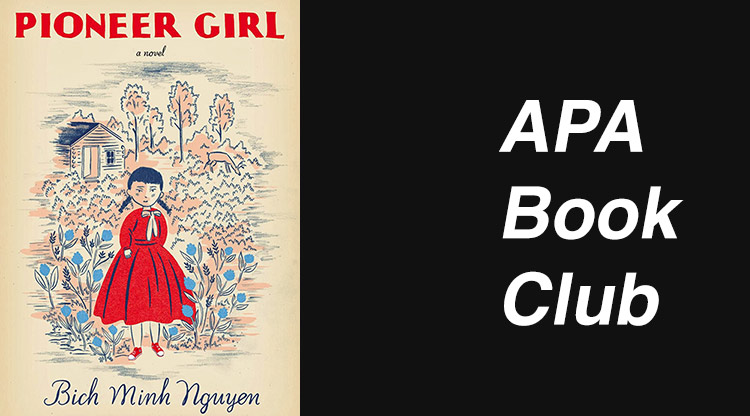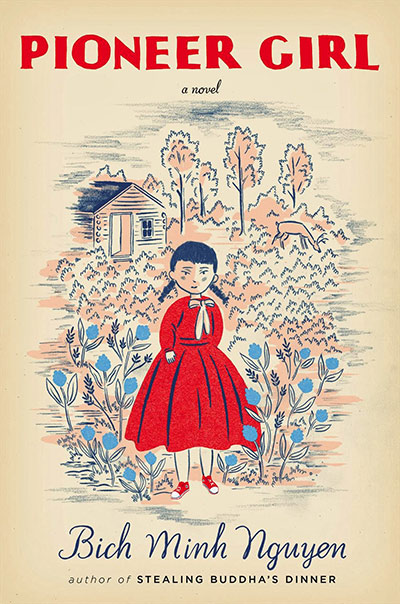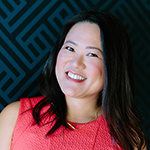 Pioneer Girl: A Novel
Pioneer Girl: A Novel is the perfect choice for the first Smithsonian APA Book Club for many reasons, one of them being main character Lee Lien’s fascination with American literature. Like many American girls — and if my friends are any indication, especially the daughters of immigrants — Lee grew up reading Laura Ingall’s Wilder’s Little House series. Beyond the usual fantasies of calico and salt pork, Lee is especially captivated by the description of a gold bar pin featuring a small cabin set by a lake. You see, Lee’s grandfather has a similar tale of an American woman named Rose who visited his cafe in Vietnam, who also left behind a small brooch with similar markings. As the story unfolds, Lee finds the pin among her mother’s jewelry, setting her off on a wild goose chase to find out if the Rose of her family stories could actually be Rose Wilder Lane, journalist and daughter of Laura Ingall’s Wilder. While the story is told is plain, first-person prose — leading you to feel as if you are reading a young woman’s memoir, rather than a work of fiction — the novel touches on many heavy notes of identity politics. The main character’s obsession with Americana goes beyond the usual girlhood daydreams, leading her to a Ph.D. dissertation on Edith Wharton’s Gilded Age New York, despite her advisor’s advice to stick with “ethnic lit”. Her academic field, coupled with her cross-country search for clues about Rose Wilder Lane, leaders her to wonder,
I’d worried that my decision to stick with Wharton for my dissertation might seem like identity avoidance. Which maybe it was. I used to figure that white people who studied nonwhite people had to have some kind of subconscious fetishizing or cultural appropriation going on.
Woven throughout the novel are themes of assimilation versus appropriation, authenticity versus stereotypes. The struggle between presenting one’s true self and culture and the image that one needs to cultivate to succeed — or just survive — in America is present, whether in Lee’s academic life or her family’s struggling business ventures. During Lee’s childhood, her family bounces from one Midwestern Chinese buffet to another (reminiscent of Jennifer 8 Lee’s Fortune Cookie Chronicles), eventually opening their own eatery, with the cringe-worthy name Lotus Leaf Cafe. Lee tries to steer Ma and her grandfather, Ong Hai, away from the generic coffee shop vibe and towards a more authentic version of a Vietnamese cafe, such as Ong Hai’s beloved Cafe 88 in Saigon. I couldn’t help but wonder if Lee’s failure to attain a job as a professor of American Literature is symbolic of the immigrant’s inability to ever been seen as a “real American”. It is only when she pursues a more personal connection between the Wilder family and her own history do opportunities begin to open. In a way, Lee’s wrestling with whether she is obligated to study “ethnic lit”, as her advisor calls it, is something I was thinking about a lot as we started this book club. Why isn’t Asian American literature more popular with mainstream readers? And why do novels about concubines with bound feet in Ancient China appeal to white readers in a way that contemporary narratives about Asians in suburban America do not? As Asian Pacific American readers, do we gravitate towards books that resonate with our own experiences? And should we be advocates of Asian American writers?
Watch Beth read an excerpt from Pioneer Girl
Whether you’re an aficionado of Asian American novels or just want to reminisce about Ma, Pa, Laura and Mary, check out Pioneer Girl and join in the conversation! Purchases made through links in this post may go towards a commission for HapaMama. 
Enter to Win a Copy of Pioneer Girl: A Novel
a Rafflecopter giveawayCongratulations to Deborah, the winner of the Pioneer Girl giveaway! For other reviews and articles about Pioneer Girl or for updates about other features that will be rolled out in August, check the Smithsonian BookDragon site and follow #APABookClub on Twitter!

The concept of assimilation&how a young Asian girl adjusting tomamerica identifies with Little house on the prairie sounds like a perfect book for me.
Ooh, I want to read this! I loved Stealing Buddha’s Dinner and am interested in Nguyen’s novel. I grew up as a second-generation Asian American in the Midwest too, and was obsessed with the Little House series!
I’ve read two of Nguyen’s books and I’m looking forward to reading this one. One, because I loved the two I’ve already read, and also because “Little House on the Prairie” was one of my favorite TV shows as a girl!
Sounds really interesting. I’m currently reading aloud all the Little House books to my 7 yr old. We love them and I like exposing my girls to the history in them but it does feel a bit ambiguous, ie, is this really part of our story as Americans or dies our mixed race ancestry make these stories just a piece of Americana for us to observe from afar? I’d love to win your giveaway and explore with my girls the intersection btw the Ingalls family pushing west and that of our own Taiwanese – Germain – Mexican immigrant ancestors being pioneer girls in their own rights…
I can so relate to those questions! That’s what I liked about this story is that is explores parallels between the way the pioneer settlers left their homes in search of a better life is really not dissimilar to the way more recent immigrants are trying to find their place or make a living in America. I will warn you that there are some mentions of the main character having casual sex (nothing graphic) with multiple partners, though.